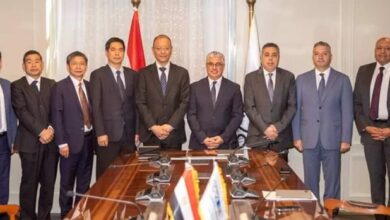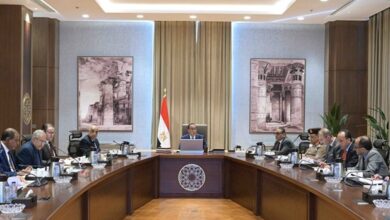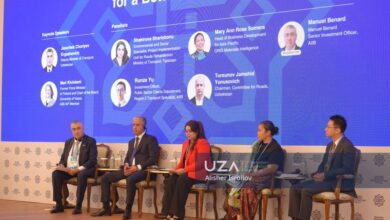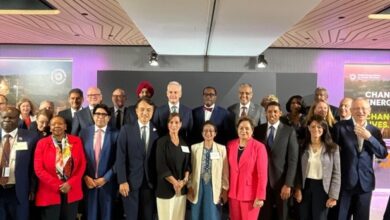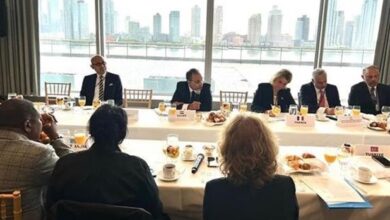Business
At the Opening Session of the Cairo Food Summit: Minister of International Cooperation Dr. Rania A. Al-Mashat Expressed that Food Security is a Top Priority for the Country’s Vision & in Programs With Multilateral & Bilateral Development Partners .
by : Amal Elwy
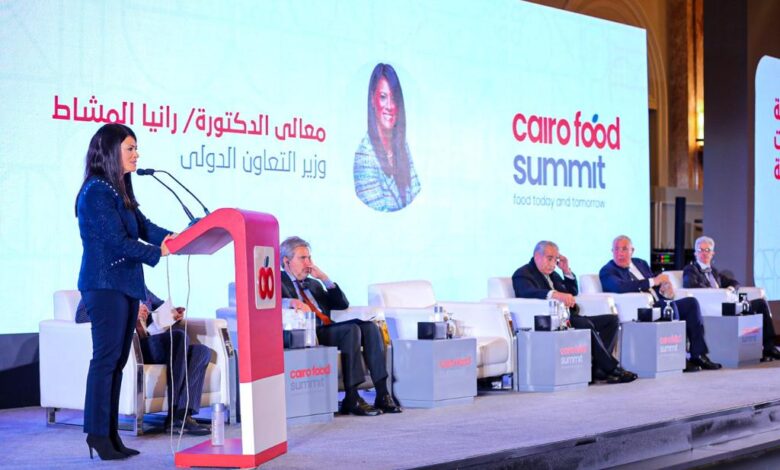
The Minister of International Cooperation H.E. Dr. Rania A. Al-Mashat participated in the opening session of the “Cairo Food Summit”, under the title “Investing in Achieving Efficiency and Sustainability of Agriculture”, which is held under the auspices of the Ministries of International Cooperation, Trade and Industry, Agriculture and Land Reclamation, Finance and Internal Trade. The event included the participation of H.E Dr. Ali Al-Moselhi, Minister of Supply and Internal Trade; H.E Al-Sayed Al-Qaisar, Minister of Agriculture and Land Reclamation; Michele Quaroni, Ambassador of Italy in Egypt; and representative of the European Union Ambassador, and the session was moderated by Dr. Alaa Ezz, Secretary General of the General Federation of Chambers of Commerce.
In her speech, Al-Mashat stressed the importance of food security as a top priority for the government, especially at this time, explaining that the country began in 2014 to significantly expand food security efforts, build silos, and expand the agricultural area.
Al-Mashat noted that the Ministry of International Cooperation is working to move quickly with multilateral and bilateral development partners to meet the country’s national priorities and achieve integration between national efforts and the efforts of international partners to provide all aspects of support in food security. During the past year, the Ministry coordinated with many development partners, including the World Bank (WBG) and the African Development Bank (AfDB), to provide emergency soft funds to support food security in light of the repercussions of the Russian-Ukrainian crisis.
The Minister stated that the programs curated through international cooperation with development partners are carried out through full coordination with national entities, to provide long-term investments to support the silos and storage sector, as 25 silos are being implemented with funding from development partners, which contributes to increasing the storage capacity of strategic grains; among them is wheat, with the EU being one of the partners on food security efforts.
Moreover, the Minister of International Cooperation touched on the various agreements concluded with development partners, including the International Islamic Trade Finance Corporation (ITFC).
Al-Mashat stressed that the private sector is a major part of the partnerships that are being implemented with development partners, as the ministry is working to empower the private sector and increase its participation in development efforts as part of the state’s priorities. Over the past three years, the private sector has obtained soft development funds and investments in companies.
The Minister spoke about the Country Platform for the Nexus of Water, Food and Energy (NWFE Program), which works to promote climate investments in 3 vital sectors, on top of which is food, in order to stimulate adaptation and mitigation efforts with climate change.
Al-Mashat indicated that the program adopts an approach based on achieving comprehensive development and directly benefits citizens by providing solutions that provide renewable energy at reasonable prices, enhance food security, and protect areas most vulnerable to the repercussions of climate change.
Al-Mashat highlighted the food pillar within the NWFE Program, which includes 5 projects that enhance adaptation efforts and support the resilience of local communities in dealing with climate changes, pointing out that the Ministry of International Cooperation has followed a joint approach based on choosing a lead development partner as a coordinator for each of the project’s pillars, where the International Fund for Agricultural Development (IFAD) is for the food pillar, to mobilize the efforts of other development partners and ensure coordination and governance of work for the desired impact.
In her speech, Al-Mashat stressed the importance of food security as a top priority for the government, especially at this time, explaining that the country began in 2014 to significantly expand food security efforts, build silos, and expand the agricultural area.
Al-Mashat noted that the Ministry of International Cooperation is working to move quickly with multilateral and bilateral development partners to meet the country’s national priorities and achieve integration between national efforts and the efforts of international partners to provide all aspects of support in food security. During the past year, the Ministry coordinated with many development partners, including the World Bank (WBG) and the African Development Bank (AfDB), to provide emergency soft funds to support food security in light of the repercussions of the Russian-Ukrainian crisis.
The Minister stated that the programs curated through international cooperation with development partners are carried out through full coordination with national entities, to provide long-term investments to support the silos and storage sector, as 25 silos are being implemented with funding from development partners, which contributes to increasing the storage capacity of strategic grains; among them is wheat, with the EU being one of the partners on food security efforts.
Moreover, the Minister of International Cooperation touched on the various agreements concluded with development partners, including the International Islamic Trade Finance Corporation (ITFC).
Al-Mashat stressed that the private sector is a major part of the partnerships that are being implemented with development partners, as the ministry is working to empower the private sector and increase its participation in development efforts as part of the state’s priorities. Over the past three years, the private sector has obtained soft development funds and investments in companies.
The Minister spoke about the Country Platform for the Nexus of Water, Food and Energy (NWFE Program), which works to promote climate investments in 3 vital sectors, on top of which is food, in order to stimulate adaptation and mitigation efforts with climate change.
Al-Mashat indicated that the program adopts an approach based on achieving comprehensive development and directly benefits citizens by providing solutions that provide renewable energy at reasonable prices, enhance food security, and protect areas most vulnerable to the repercussions of climate change.
Al-Mashat highlighted the food pillar within the NWFE Program, which includes 5 projects that enhance adaptation efforts and support the resilience of local communities in dealing with climate changes, pointing out that the Ministry of International Cooperation has followed a joint approach based on choosing a lead development partner as a coordinator for each of the project’s pillars, where the International Fund for Agricultural Development (IFAD) is for the food pillar, to mobilize the efforts of other development partners and ensure coordination and governance of work for the desired impact.




